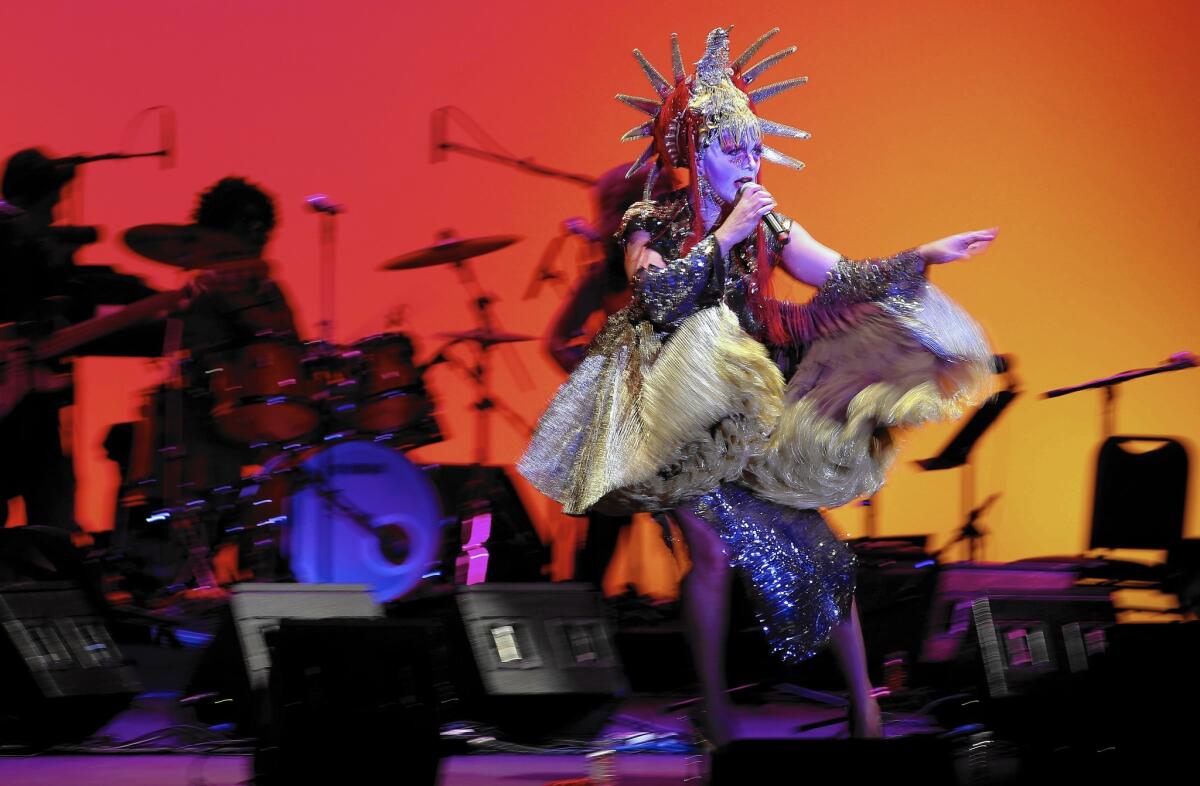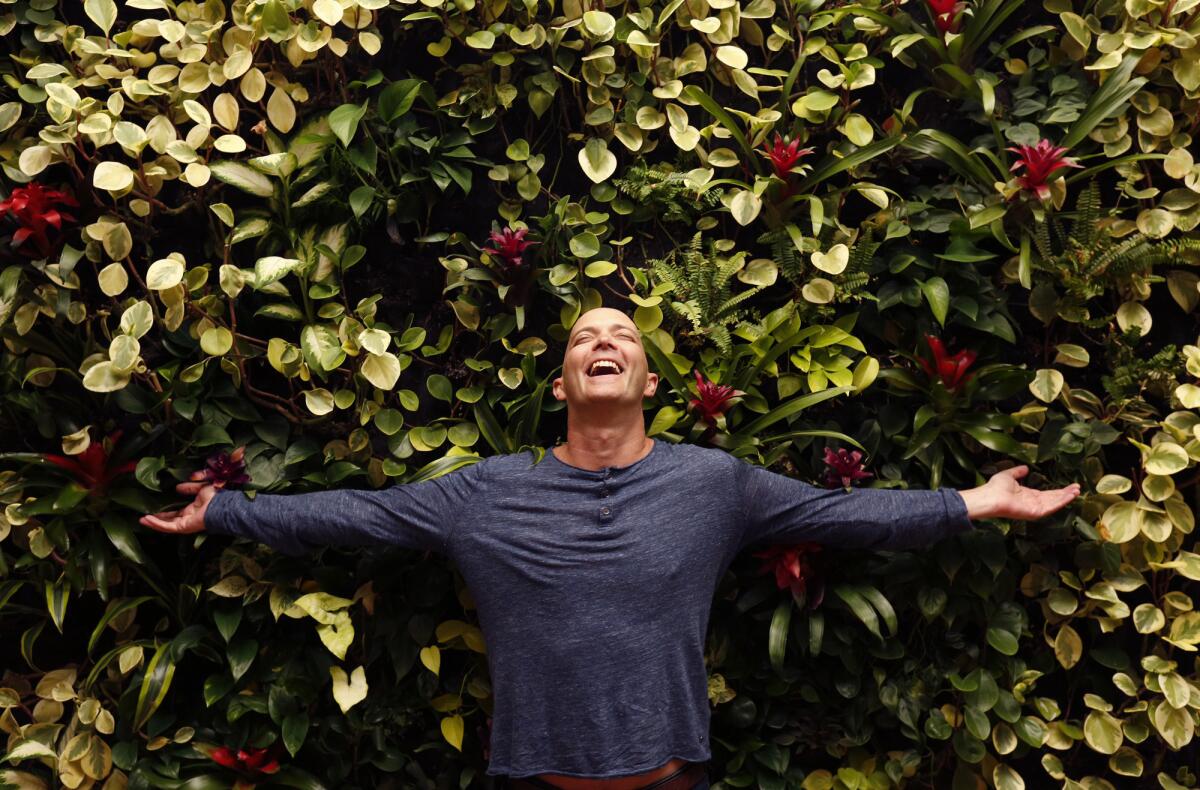Review: Taylor Mac offers a glorious sneak peek of ‘24-Decade History of Popular Music’ at Royce Hall

- Share via
Who is Taylor Mac?
To answer this philosophical question, one must experience this polymorphous artist onstage. But it’s likely that those lucky enough to have been in attendance at Royce Hall on Saturday night for Mac’s “24-Decade History of Popular Music: The 20th Century Abridged” will have different opinions on the matter.
As a performer, Mac might well be the love child of David Bowie and Liza Minnelli. Conceptually cool yet full of old-fashioned razzmatazz, this drag artist is also a queer playwright who enjoys liberating audiences from traditional gender categories, sexual hierarchies and other forms of “hetero-normative” oppression.
See the most-read stories in Entertainment this hour >>
Mac prefers to go by the gender pronoun “judy.” I’m happy to oblige, but bear with me if I occasionally stumble. (Mac’s attitude about these things is that it’s a group effort of education and evolution.)
A darling of the New York alternative scene who has been praised to the hilt in the pages of the New York Times as a performer (the Foundry Theater’s production of Bertolt Brecht’s “Good Person of Szechwan”), a playwright-performer (“The Lily’s Revenge”) and a dramatist (“Hir”), Mac has been expanding his cult since he moved from the drag club scene to the most prestigious venues off-Broadway.
Give Mac another few years and radical gender-bending judy will no doubt be headlining the Hollywood Bowl. (Perhaps even with a sparkly new gender pronoun.)
The show at Royce Hall offered a sneak peek of the magnum opus Mac has been working on. The Center for the Art of Performance at UCLA is one of the commissioners of this marathon project, which will examine U.S. history decade by decade through song. The plan is for a 24-hour concert, one that will provide some kind of makeshift sleeping arrangements. A medical tent, Mac shared, will also be set up.
Mac doesn’t like to rush. Saturday’s “abridged” show, focused on the 20th century, was supposed to take two hours but ran closer to three (judy joked at one point that it was turning into “Angels in America.”)
The event was characterized by Mac as “a Radical Faerie realness ritual.” The past was honored and sacrificed so that the future could be dreamed forward. Insouciant camp may have been the dominant note, but the politics were deadly serious.
Queer theory was all the rage when the 43-year-old performer from Stockton, Calif., was coming of age in the 1990s, and Mac translates this theory into performance practice. The production reveled in blurring lines, dissolving dichotomies and resisting closure.

I use each song to kind of sacrifice something we’re holding onto, whether it’s our understanding that patriarchy should be in charge of things or our fear of being misgendered,” Taylor Mac says.
Just as there was no parsing of the letters LGBT into ideological compartments (Mac is the freaky Pied Piper of the marginalized), the divide between performer and audience was also lifted. This was an interactive event, in which Mac clomped down from the stage in dazzling footwear and retrieved unsuspecting theatergoers to take part in the act. (Recruits included an “A+ gay,” a bearded hipster and an older couple who looked like deer in headlights but who turned out to be completely game and winning.)
The bearded hipster and another blond guy were conscripted for a segment that transplanted Rodgers & Hammerstein’s “The Surrey With the Fringe on Top” to the German countryside. The fair-haired men were asked to wear Nazi armbands while two other audience members were called on to play carriage-drawing horses.
Mocking the horrific past by mixing it with incongruous elements is one tactic Mac employs to unsettle our sense of history. This may not be the most precise strategy of cultural critique, but Mac isn’t after perfection, as judy periodically explained.
Unwieldiness, informality, rawness, even misfires are part of judy’s aesthetic. One off-the-cuff quip about the handicapped elicited groans, but queer wisecrackers, judy tried to argue, have a special license.
Mac’s patter between numbers sprang with an improvisational fervor from theory to therapy. Witty, compassionate, utopian and at times unapologetically academic, Mac credited writer and punk performer Patti Smith and ukulele-strumming Tiny Tim as influences, but I wouldn’t have been surprised had judy also acknowledged cultural critic Wayne Koestenbaum and TV spiritual guru Oprah Winfrey.
The free-flowing talk was generally engaging, but the show was most effective when it theatrically embodied its truths. There’s no better emblem of ambiguity, indeterminacy and queer fabulousness than Mac in one of Machine Dazzle’s costume creations, which are themselves subject to multiple interpretations. (Act 1 featured a Statue of Liberty headdress for a Las Vegas showgirl; Act 2 brought out a fool’s motley as reconceived for a New Year’s Eve rave.)
Finally, how was the music? The arrangement of songs, not all of which were properly introduced or credited, were perfectly tailored to Mac’s vocal range. Judy, no surprise, is a belter in the slightly boozy-seeming Judy Garland mode. But Mac can also do arty British pop and straightforward American standards, though judy rowdily brought in the audience to spice up the latter.
Music director Matt Ray drew out the best in Mac and the superb orchestra. The moody reworking of the 1980s Laura Branigan hit “Gloria” was a high point. Mac emphasized the song’s expression of frenzied ambition, only to exorcise the feeling for all of us. Nina Simone’s “Mississippi Goddam” came with an almost apologetic preface, but Mac’s singing made perfectly clear the connections among oppressed groups.
A generous performer, Mac ceded the stage to the Mariachi Reyna de Los Angeles before joining these female musicians and singers who brought audience members to their feet at the end of their lively set. After intermission, revelers hijacked the stage for a queer striptease.
Mac enclosed everything in an eccentric bubble that not only welcomed but celebrated difference.
More to Read
The biggest entertainment stories
Get our big stories about Hollywood, film, television, music, arts, culture and more right in your inbox as soon as they publish.
You may occasionally receive promotional content from the Los Angeles Times.











